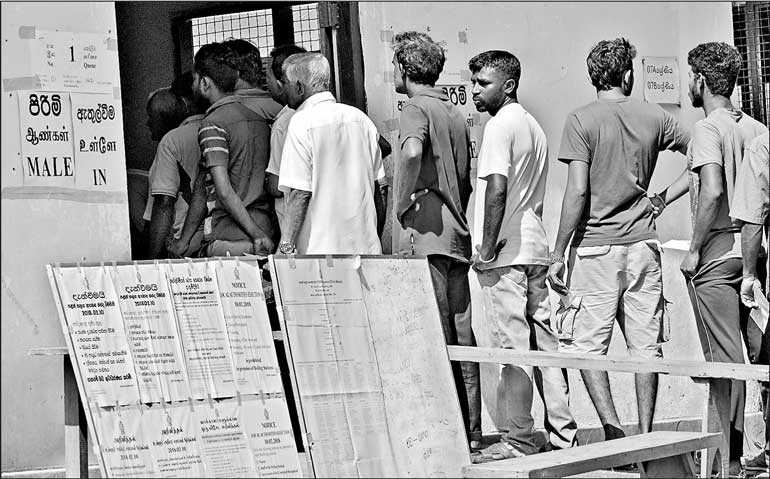Monday Feb 23, 2026
Monday Feb 23, 2026
Saturday, 28 December 2019 00:04 - - {{hitsCtrl.values.hits}}

By Shailendree Wickrama Adittiya
People’s Action for Free and Fair Elections (PAFFREL) has proposed stronger efforts to fight misinformation, monitor campaign funds, and limit the number of candidates to save public resources, in its latest report compiled after observing multiple elections.
The interim report looked at the 2019 Presidential Elections, held on 16 November, as well as election law violations, making a comparison between the incidents that occurred in 2010, 2015, and 2019.
A total of 672 incidents were reported this year, a decrease from 2015’s 710 incidents and 2010’s 702 incidents. There were fewer incidents of death, assault, threats, damage to property, attacks on campaign offices, and misuse of public property and State power this year than in the previous two presidential elections. However, there was a significant increase in non-violent incidents excluding State power, with 405 incidents reported this year, and only 292 in 2015 and 143 in 2010.
According to the report, even the most insignificant incidents were reported to election monitoring bodies through a number of avenues this year, thus pointing to an increase in awareness among citizens about election law violations as well as monitoring bodies.
Given these incidents, PAFFREL, in its interim report, says that although the 2019 Presidential Elections were free, they were not fair. Added to this, there are a number of factors that must be considered in the long term and directly affect elections. As such, PAFFREL has made proposals for steps that can be taken to ensure a free and fair election in the future.
Social media is one of the main areas PAFFREL has focused on in their report, and the organisation acknowledges the increasing use of social media in the country. PAFFREL has worked closely with both the Elections Commission as well as Facebook’s teams to monitor social media, and has examined over 11,000 Facebook pages, including party and candidate pages, during election time.
While over 2,000 incidents, including fake news, human rights and election law violations, and hate speech, were reported during election time, PAFFREL suggests legislation related to social media usage in accordance to international regulations and the establishment of monitoring bodies to analyse and examine social media usage in the country.
PAFFREL has also asked for a ten-year validity period of voter registration certificates, as well as the establishment of a central database to avoid any issues with voter identification, especially repeat NIC names and numbers. In addition to these, a proposal has also been made for a permanent voter identification card, so that a temporary ID need not be issued for voters that do not have an NIC.
An advance voting system is also one of the policy changes detailed in the interim report, with PAFFREL identifying it as a way to increase voter turnout. Sri Lankan nationals residing in foreign countries should also be allowed to cast their votes, starting with voting facilities for local staffers in foreign missions, the report states.
PAFFREL has also proposed that campaign budgets and spending, as well as the number of candidates be limited. Regarding the latter, PAFFREL proposes that the election deposit made by candidates is increased from the current Rs. 50,000 for candidates registered with a political party to one million rupees and Rs. 75,000 for independent candidates to five million rupees.
In addition to this, PAFFREL proposes that candidates must submit a certified document that shows they have been politically active within the past year, and also calls for an amendment of the current political party registration laws.